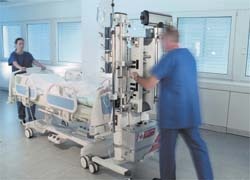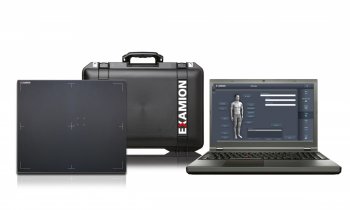The IMEC transport system
12-month pilot study results
For the past 12 months the intensive care unit (ICU) at Nuremberg Hospital North, Germany, has been testing the IMEC transport system.

For the past 12 months the 20SGL intensive care unit (ICU) at Nuremberg Hospital North, Germany, has been testing the IMEC (Interdisciplinary Medical Equipment Carrier) transport system, made by TRUMPF Kreuzer Medical Systems. The ICU recently concluded that the system has made intensive care transport considerably safer and saves up to 40% in pre-op and post-op time. ‘The costs alone for the new system have amortized, because it has helped avert equipment crashes and prevent transport damage that would have developed within just two to three years,’ said Markus Ziegler, Deputy Manager of the ICU, who is also responsible for product tests of new medical devices. ‘For pre-op and post-op transport, we currently need only about 40–50 minutes instead of 70 – thus saving about 40% in time in the pre-op and post-op phase, as well as during other relocation transports. Overall, the intensive care station documented 31,700 transport minutes in 2005 – initial savings through IMEC included.’ Doctors and nurses at the Nuremberg ICU are not only pilot users of IMEC, they are also contributors to the current quality and functionality of the transport system. The Puchheim-based manufacturer customised it in close collaboration with the users and in accordance to their needs.
Sample calculation of savings using IMEC:
Average number of transports per da = 4
Number of working days per annum = 220
Time saving per transport = 20 minutes
Average hourly rate per nurse = 39 €
Time saving per annum = 293 hours
Financial savings per annum per person = 11,440 €
Since October 2005, the ICU has been using two IMEC solo transport units for transporting all equipment-dependent patients from the intensive care unit to exam rooms or the OR. The principle of IMEC is to function as a connector between ceiling-mounted and mobile medical supply units, to be compatible with medical and technical equipment of all types and machine brands – from IV management to respiration systems and monitoring systems – and to dock onto every conventional ICU bed. All supply lines and cables are protected against strong pulls or even breakages; the patients remain securely connected to the IV and life support devices during the entire transportation. (The system even provides space for an emergency bag, gas bottle holder and suction system).
Despite a loading capacity of up to 65 kilograms, the unit – consisting of bed and IMEC that can be securely connected in any situation - can be comfortably moved by two nurses. It can be manoeuvred in a tight space and fit into any 3-metre-long elevator.
TRUMPF Medizin Systeme has subsidiaries in Great Britain, France, Italy, the USA, China, and Singapore.
30.08.2006






